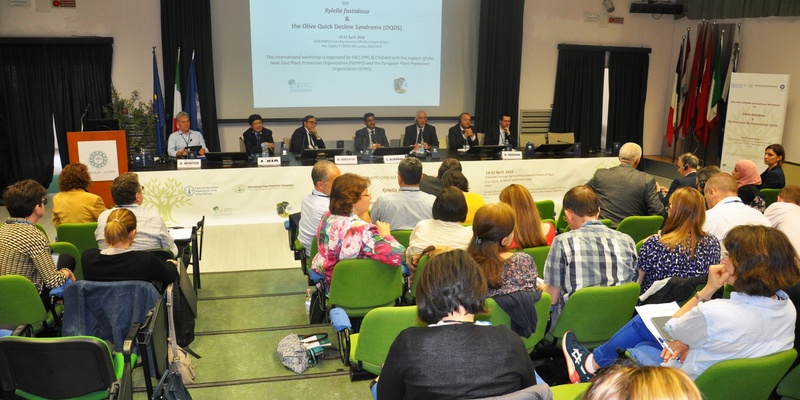The FAO-IPPC-CIHEAM International Workshop on Xylella fastidiosa successfully held in Bari Italy
Posted on Wed, 04 May 2016, 11:25

The FAO-IPPC-CIHEAM International Workshop on Xylella fastidiosa & the Olive Quick Decline Syndrome (OQDS) was successfully held from 19-22 April 2016, in Bari, Italy. The Workshop was organized by FAO, IPPC and CIHEAM (the International Centre for Advanced Mediterranean Agronomic Studies), with support of the Near East Plant Protection Organization (NEPPO) and the European Plant Protection Organization (EPPO). This is the first international workshop on Xylella fastidiosa since such destructive phytosanitary pest was reported on the olive trees in 2013, in Puglia, Italy. Over 140 participants attended the Workshop, who is from 36 countries as well as eight international and regional organizations. Mr Jingyuan Xia, the IPPC Secretary, delivered opening remarks on behalf of FAO and IPPC as well as NEPPO and EPPO. Mr Orlando Sosa (the Leader of Implementation Facilitation Team), Ms Sarah Brunel (the Implementation Officer) and Ms Adriana Moreira (the Standards Officer) from the IPPC Secretariat, attended the Workshop.
The main objectives of the Workshop were a) to raise awareness of the issue of Xylella fastidiosa, its current and potential impact and management; b) to share information on and experience in legislation, communication, advocacy, education and technical actions for eradicating, containing and managing the pest; c) to discuss the strategies, tactics, and action for increasing the capacities in surveillance, diagnostic and management of the pest; and d) to promote a close cooperation at national, regional and global levels for fighting with this devastating phytosanitary pest.
The Workshop included three major activities: a) review and information sharing, such as status and impacts, international cooperation and projects, and legislation aspects; b) technical training and field observation on surveillance and diagnostic methods; and c) capacity development for management of Xylella fastidiosa. In particular, participants were well trained in recently developed methods and technical protocols for early surveillance, diagnosis and control, including sampling the vector and host plants through demonstrations of field data acquisition. The mobile application XylApp was introduced by the CIHEAM, which helps to gather and quickly transfer field data to a Central Webserver towards the production of report findings.
The Workshop concluded with a recap of capacity development activities on Xylella fastidiosa undertaken in the Mediterranean basin. Participants agreed that continued aggregation of information on the bacterium, its vector and host species were critical but equally important going forth would be the establishment of a network for sharing knowledge, raising awareness, and increasing the capacity of National Plant Protection Organizations (NPPOs) against the spread of this pathogen to other countries.
The workshop was covered by 15 local news channels, as well as news in print. A sample of TV coverage.
The first two days of the meeting were webcast and the recordings can be found at: https://cloud.iamb.it/index.php/s/UcblWBXyx7t8Xlu

